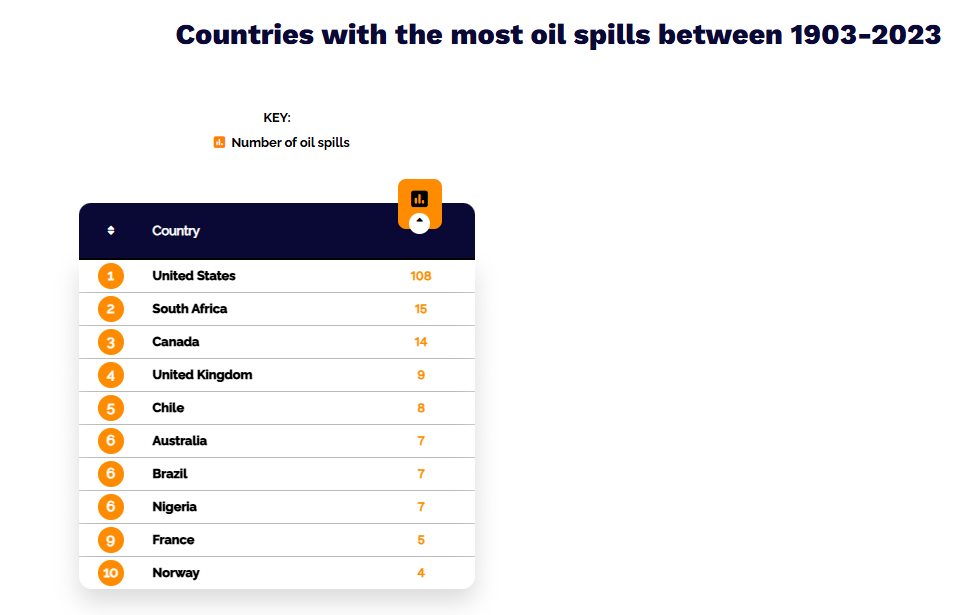Introduction: Why the Oil Spills Index Matters
In today’s environmentally-conscious business landscape, the Oil Spills Index has become a crucial metric for energy companies, investors, and regulatory bodies. This comprehensive guide examines what the index measures, its implications for UK businesses, and how companies can mitigate their spill-related risks.
1. Understanding the Oil Spills Index
What is the Oil Spills Index?
A standardized measurement that tracks:
- Volume of oil spilled (barrels)
- Frequency of spill incidents
- Environmental damage severity
- Cleanup efficiency metrics
- Preventative measures effectiveness
Key Components of the Index
| Component | Weighting | Measurement Period |
|---|---|---|
| Spill Volume | 40% | Annual |
| Incident Frequency | 25% | Quarterly |
| Ecological Impact | 20% | Per incident |
| Response Time | 15% | Per incident |
2. 2025 Global Oil Spill Statistics
Recent Trends (2019-2025)
- 23% reduction in major spills (>700 barrels) since 2019
- Increase in pipeline incidents (42% of 2023 spills)
- Shipping accidents account for 28% of total volume
Regional Comparison
| Region | 2023 Incidents | Total Volume (barrels) |
|---|---|---|
| North Sea | 14 | 5,200 |
| Gulf of Mexico | 29 | 18,700 |
| Niger Delta | 47 | 32,500 |
| Southeast Asia | 22 | 9,800 |
3. Business Implications for UK Companies
Financial Risks
- Cleanup costs: Average £12,500 per barrel
- Regulatory fines: Up to £1M per incident under UK law
- Reputation damage: 65% of consumers reconsider suppliers after spills
Operational Impacts
✔ Increased insurance premiums
✔ Stricter compliance requirements
✔ Supply chain disruptions
✔ Investor scrutiny (ESG factors)

4. UK Regulatory Framework
Key Legislation
- Environmental Protection Act 1990
- Merchant Shipping Act 1995
- Offshore Safety Directive 2013
- OPRC Convention requirements
Reporting Requirements
- Immediate notification for spills >1 barrel
- Detailed incident reports within 14 days
- Annual environmental statements
5. Prevention and Mitigation Strategies
Technological Solutions
- AI monitoring systems (early leak detection)
- Double-hulled tankers (reduces spill risk by 60%)
- Robotic cleanup drones (faster response)
Best Practices
✔ Regular pipeline integrity tests
✔ Employee spill response training
✔ Secondary containment systems
✔ Spill response drills (quarterly minimum)
6. Case Study: North Sea Operations
Incident: 2022 pipeline leak (320 barrels)
Response:
- Contained within 4 hours
- 98% recovery rate
- £2.8M total costs
Lessons: - Importance of automatic shutoff valves
- Value of pre-positioned cleanup equipment

7. Future Outlook and Innovations
Emerging Technologies
- Nanotech absorbents (100x more effective)
- Bioremediation enhancements
- Satellite monitoring networks
Regulatory Trends
- Stricter liability frameworks
- Mandatory spill insurance minimums
- Real-time reporting requirements
Conclusion: Turning Data into Action
The Oil Spills Index provides more than just statistics – it offers actionable insights for businesses to improve their environmental performance and risk management. By understanding these metrics and implementing robust prevention strategies, UK energy companies can protect both their operations and their reputations.
At ScaleX Technology, we help energy businesses interpret environmental data and implement cutting-edge risk management solutions. Our expertise can help you reduce spill risks, ensure compliance, and maintain operational continuity.
Contact us today to discuss how we can help your business stay ahead of environmental risks.
